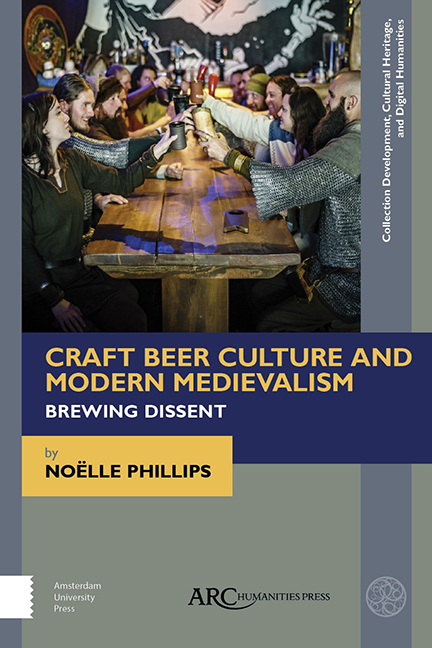Book contents
- Frontmatter
- Contents
- List of Illustrations
- Acknowledgements
- Chapter 1 Introduction: Medievalism and Craft Beer
- Chapter 2 Reading Beer in the Middle Ages
- Chapter 3 Resistance and Revolution: Craft Beer Versus Corporate Giants
- Chapter 4 Beer Heroes and Monastic Medievalism
- Chapter 5 Militant Medievalism: Norsemen, Mythology, and Masculinity
- Chapter 6 Pale Ales and White Knights: Craft Brewing, Whiteness, and Medievalism
- Chapter 7 Conclusion: The Alchemy of Alcohol
- Select Bibliography
- Index
Chapter 3 - Resistance and Revolution: Craft Beer Versus Corporate Giants
Published online by Cambridge University Press: 20 November 2020
- Frontmatter
- Contents
- List of Illustrations
- Acknowledgements
- Chapter 1 Introduction: Medievalism and Craft Beer
- Chapter 2 Reading Beer in the Middle Ages
- Chapter 3 Resistance and Revolution: Craft Beer Versus Corporate Giants
- Chapter 4 Beer Heroes and Monastic Medievalism
- Chapter 5 Militant Medievalism: Norsemen, Mythology, and Masculinity
- Chapter 6 Pale Ales and White Knights: Craft Brewing, Whiteness, and Medievalism
- Chapter 7 Conclusion: The Alchemy of Alcohol
- Select Bibliography
- Index
Summary
THE PREVIOUS CHAPTER ended with the early modern period, and this chapter leaps into the 1980s. There is, of course, a wealth of sociohistorical information about the centuries in between; the full story of craft beer does not begin with the American legalization of homebrewing in 1978. It was not until the 1980s, however, that the industry began to develop into the form in which we see it today, in both Canada and the United States. This chapter provides the important corporate context for the rapid growth of craft brewing in North America and considers how the political and social ideologies of craft beer were largely shaped by resistance and dissent while simultaneously— and unconsciously— becoming complicit with those same points of resistance.
Beer Production in North America:
Corporate Giants and the “Little Guys”
The craft-brewing industry in North America is both a response to and a result of the growth of corporations. One cannot explore the craft beer industry without also understanding the rise of powerful North American corporate brewers, those whose names are widely recognized even by non-drinkers— companies such as Budweiser, Miller, Coors, Molson, and Labatt. These beer giants hold a monopoly on the industry but also offer an ideologically useful contrast to the growing population of craft brewers seen by themselves and others as the “authentic little guys.” In summarizing the pattern of craft and corporate growth over the past several decades, I hope to provide some important economic context for the sociocultural impact of craft beer and the use of history in its marketing. While beer has a storied history from the early modern period until the early twentieth century, my focus is predominantly on what happened in Canadian and American brewing from the late 1970s until today. During these past forty years, craft brewing has become not only an increasingly influential economic player, but a cultural symbol of taste, ingenuity, freedom, and (comprising all these things) masculinity.
The temperance movement and the years of Prohibition (1920– 1933 in the United States, 1919– 1920 in Canada) dealt a hard blow to small-scale brewers. When US Prohibition ended in 1933, the only brewers that could survive were those that were already large— companies such as Pabst and Coors.
- Type
- Chapter
- Information
- Craft Beer Culture and Modern MedievalismBrewing Dissent, pp. 47 - 66Publisher: Amsterdam University PressPrint publication year: 2019



